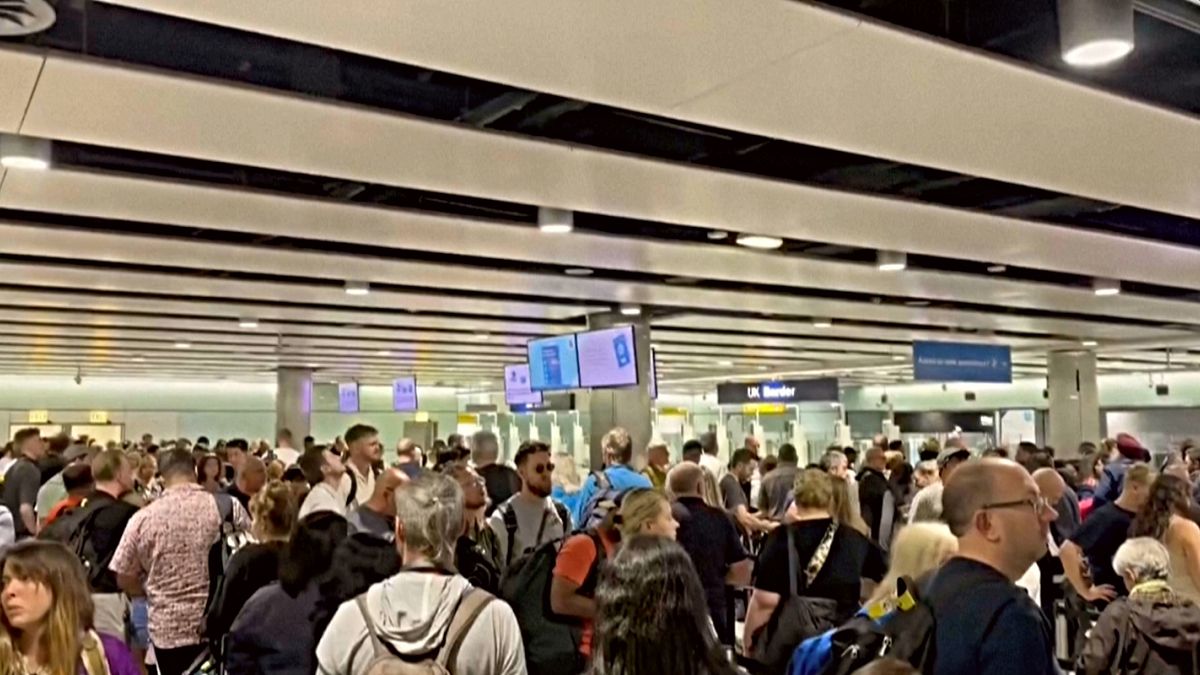Several of the UK’s busiest airports saw their e-gates system fail on Tuesday – but is it concerning or par for the course?
E-gates at airports across the UK have returned to normal following a mass outage which caused disruption and huge queues for thousands of passengers.
On Tuesday, the electronic gates Heathrow, Gatwick, Stansted, Edinburgh, Birmingham, Manchester and Bristol airports stopped working, delaying passengers who were trying to cross the UK border.
The British Home Office has ruled out a cyberattack as the cause. They say the widespread delays were down to a nationwide technical outage.
“As soon as engineers detected a wider system network issue at 19:44 pm last night, a large-scale contingency response was activated within 6 minutes,” they told Euronews Travel.
“At no point was border security compromised and there is no indication of malicious cyber activity,” they added, “We apologise to travellers caught up in disruption and thank our partners, including airlines for their cooperation and support.”
How did the e-gate outage come about at the UK’s airports?
There are more than 270 automated gates across 15 air and rail ports in the UK. They all use advanced facial recognition technology to allow people to enter the country – but Tuesday’s debacle meant that Border Force workers had to process people manually, causing significant delays.
This week’s incident is not the first time these automated e-gates have stopped working.
Airports across the UK were also impacted by an IT issue in May 2023 and, in August that year, around 2,000 flights at airports across the UK were cancelled after the National Air Traffic Services system for automatically processing flight plans failed.
On that occasion, thousands of passengers were left stranded.
Could another affect the Entry/Exit system?
Come October, the EU will introduce its new Entry/Exit System (EES).
A post-Brexit initiative, the EES will require fingerprints and facial scans to be taken from UK travellers heading to EU countries and those in the Schengen Zone.
A report last month found that almost two thirds of UK adults are unaware of the EES scheme, with many saying they are ‘put off’ the idea of travelling to Europe because of the new system. Most were worried by the facial recognition system which means photos of them will be stored for three years.
The UK government has since announced that an app to help ease queues at airports and seaports will be delayed, prompting naysayers to predict chaos at the UK border.
E-gates themselves have long been problematic. In 2021, technical issues caused them to fail three times in just two months.
The unreliability of the system has raised questions over the Border Force’s desire to create a so-called “intelligent border” with new e-gates capable of allowing arrivals into the UK using only advanced facial recognition.
Previously, Phil Douglas, the director-general of the Border Force, has said plans for the initiative have been designed to bring Britain’s border up to world class standard.
Trials are set to be held later this year, but some may say, amid the chaos of the current e-gates, their success may not be guaranteed.

